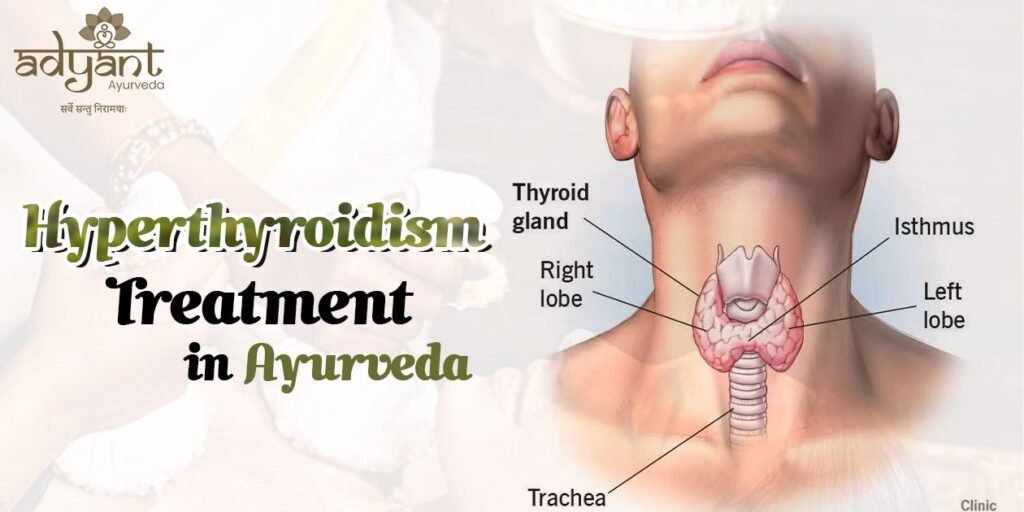Table of Contents
ToggleAyurvedic treatment for hyperthyroidism focuses on calming excess metabolism, balancing aggravated Pitta and Vata, and supporting the nervous system naturally. Hyperthyroidism happens when the thyroid gland produces too much thyroid hormone (T3 and T4), which speeds up body functions like heartbeat, digestion, temperature control, energy use, and brain activity.
When thyroid hormones stay high for long, the body remains in an “overactive mode”, which can slowly affect the heart, bones, muscles, sleep, mood, and fertility.
What Happens If Hyperthyroidism Is Not Treated?
If hyperthyroidism is ignored or left unmanaged, it may cause:
- Irregular heartbeat (arrhythmia)
- Heart failure risk
- Bone loss and osteoporosis
- Muscle weakness and wasting
- Thyroid storm (life-threatening emergency)
- Menstrual irregularities and fertility issues
- Graves’ eye problems (ophthalmopathy)
Ayurvedic Perspective: Hyperthyroidism is seen as a systemic imbalance involving metabolism (Agni), nervous system, endocrine regulation, immune response, mental stress, and tissue nourishment. Ayurvedic care emphasizes gradual stabilization, long-term resilience, and overall health, rather than rapid hormone suppression.
Medical Note: Ayurveda is not a substitute for emergency care. In moderate to severe hyperthyroidism, Ayurvedic care should be supportive and integrative under supervision.
Types of Hyperthyroidism (Clinical Classification)
- Graves’ Disease: Autoimmune overstimulation, often with eye involvement
- Toxic Multinodular Goiter: Multiple overactive thyroid nodules
- Solitary Toxic Adenoma: Single overactive nodule
- Thyroiditis (Inflammatory): Postpartum or subacute inflammation; often transient
- Iodine-Induced Hyperthyroidism: Triggered by excess iodine exposure or medications
Ayurvedic relevance: Chronic autoimmune and nodular forms often need longer stabilization and restoration of vital energy (Ojas), while inflammatory types emphasize Pitta pacification and tissue recovery.
Hyperthyroidism: Modern Medical Overview
Diagnostic Criteria
- Low TSH
- Elevated Free T3 (FT3) and Free T4 (FT4)
- Optional: Thyroid antibody tests, ultrasound, or radioactive iodine uptake scans
Common Causes of Hyperthyroidism
Hyperthyroidism may be caused by:
- Graves’ disease (autoimmune)
- Toxic multinodular goiter
- Thyroid nodules
- Excess iodine intake
- Postpartum thyroiditis
- Medications or supplements
- Chronic psychological stress affects the hypothalamic-pituitary-thyroid axis
Risk Factors for Hyperthyroidism
You may be at higher risk if you have:
- Female sex
- Age over 60 (atypical symptoms: fatigue, weight loss)
- Family history of thyroid or autoimmune disease
- Postpartum period
- Autoimmune conditions (type 1 diabetes, lupus)
- High iodine exposure
Ayurvedic Understanding of Hyperthyroidism
What This Really Means in Ayurveda
Hyperthyroidism in Ayurveda is seen as a dosha imbalance with:
- Ati‑Pravritti of Agni: Excessive metabolism
- Pitta Aggravation: Overheating, inflammation, irritability
- Vata Vitiation: Anxiety, tremors, irregular heart rhythm
- Kapha Depletion: Reduced nourishment and stability
- Ojas Kshaya: Loss of vital essence
So instead of only focusing on the thyroid gland, Ayurvedic treatment for thyroid imbalance works on the whole body.
Srotas Involved in Hyperthyroidism (Ayurveda)
The body channels commonly affected include:
- Rasa & Prana (nutrition & vitality)
- Medovaha & Asthivaha (fat & bone tissues)
- Majjavaha & Manovaha (nervous & mental health)
- Annavaha & Swedavaha (digestion & sweating)
Autoimmune hyperthyroidism involves deeper immune dysregulation, chronic stress, and Ojas depletion.
Signs & Symptoms of Hyperthyroidism
Common signs include:
- Unintentional weight loss despite appetite
- Rapid or irregular heartbeat
- Heat intolerance, excessive sweating
- Tremors
- Anxiety, irritability, restlessness
- Insomnia
- Frequent bowel movements
- Muscle weakness
- Goiter
- Menstrual irregularities & fertility concerns
- Eye symptoms (in autoimmune cases)
Red Flag Symptoms (Seek Immediate Medical Care)
Seek immediate medical care if you experience:
- Sudden severe palpitations or chest pain
- High fever with agitation or confusion
- Profuse sweating with rapid heart rate
- Severe breathlessness
- Worsening tremors or anxiety
- Sudden vision changes or eye pain
- Collapse or fainting
These may indicate thyroid storm or cardiovascular emergency.
Goals of Ayurvedic Management for Hyperthyroidism
The goal of Ayurvedic care is to improve stability and long-term recovery.
Main Goals
- Stabilize aggravated Vata & Pitta
- Gradually normalize metabolism
- Support neuro-endocrine-immune balance
- Protect the heart, bones, muscles, and nervous system
- Rebuild Ojas for long-term resilience
- Reduce stress-driven hormone overstimulation
This is why many people choose Ayurvedic medicine for hyperthyroidism as supportive care.
Who Should NOT Start Ayurvedic Treatment First?
Ayurveda should not be started as the first treatment in:
- Thyroid storm or acute crisis
- Severe uncontrolled arrhythmias
- Rapidly deteriorating FT3/FT4
- Pregnancy with uncontrolled hyperthyroidism
- Severe active Graves’ ophthalmopathy
- The elderly with cardiac disease
- Extreme muscle wasting
In these cases, conventional treatment is essential first.
Limitations of Ayurvedic Treatment for Hyperthyroidism
Let’s keep expectations realistic:
- Does not rapidly suppress thyroid hormones
- Requires time, consistency, and monitoring
- Severe cases may need conventional medication
- Outcomes depend on compliance, lifestyle, and clinical monitoring
But yes, Ayurvedic support for hyperthyroidism can help improve symptoms and reduce relapses.
Monitoring & Follow-Up Plan (Must Do)
A safe plan includes:
- Regular TSH, FT3, FT4 tests
- Track heart rate, weight, sleep, anxiety, and tremors
- Coordinate with the endocrinologist
- Adjust Ayurvedic therapy based on response and labs
Panchakarma Therapy for Hyperthyroidism (Physician-Supervised)
Panchakarma Treatment can help in selected cases, but only after proper screening.
Panchakarma Options
- Virechana: Pitta elimination
- Nasya: Neuro-endocrine support
- Shirodhara: Autonomic nervous system calming
- Abhyanga: Muscle preservation, Vata pacification
- Basti: Chronic systemic Vata balance
Contraindications: Pregnancy, severe underweight, cardiac instability, and active eye disease.
Ayurvedic Herbs for Hyperthyroidism
Here are commonly used herbs for thyroid support in Ayurveda:
| Herb | Role |
|---|---|
| Guduchi | Immunomodulatory, Pitta-Vata pacifying |
| Brahmi & Shankhapushpi | Nervine tonics, reduce anxiety |
| Shatavari | Cooling, nourishing |
| Sariva & Chandana | Anti-inflammatory, cooling |
| Kanchanara Guggulu | Supports thyroid gland balance |
| Mukta Pishti | Pitta calming, cardiac support |
| Ashwagandha | Adaptogen, used cautiously after stabilization |
⚠️ Always take herbs only under a qualified Ayurvedic doctor’s guidance.
Ayurvedic Remedies for Hyperthyroidism
- Calming Herbal Decoction: Brahmi, Shankhapushpi, Guduchi to reduce anxiety & stabilize metabolism
- Stress-Balancing Preparations: Shatavari with milk for nervous exhaustion
- Detox Protocols: Mild, physician-supervised detox to remove accumulated toxins (ama)
- Daily Practices: Abhyanga (self-massage), gentle yoga, meditation, cooling pranayama (Shitali, Chandra Bhedana)
Diet & Nutrition for Hyperthyroidism (Ayurvedic Guide)
Simple Diet Principles
A good diet for hyperthyroidism should be:
- Cooling, nourishing foods to pacify Pitta
- Adequate protein to prevent muscle loss
- Calcium & vitamin D for bone health
- Avoid excessive iodine
- Limit stimulants (coffee, tea, energy drinks)
Important Nutrients
| Nutrient | Why it helps | Sources |
|---|---|---|
| Protein | prevents muscle loss | legumes, dairy, nuts |
| Calcium + Vitamin D | supports bones | milk, greens, sunlight |
| Zinc + Selenium | supports thyroid health | seeds, nuts, grains |
Recommended Foods
- Whole grains: Rice, barley, oats
- Fruits: Pomegranate, pear, berries
- Vegetables: Cooked cruciferous vegetables (broccoli, cauliflower)
- Dairy (light): Milk, buttermilk, curd
- Healthy fats: Olive oil, coconut oil, seeds & nuts
- Herbal teas: Cumin, coriander, fennel
- Hydration: Coconut water, mild herbal infusions
Foods to Avoid
- High-iodine foods: iodized salt, seaweed, fish
- Caffeine & stimulants
- Soy products & gluten (if sensitive)
- Alcohol, processed & fried foods
- Excessively spicy or sour foods
Focus on balanced Agni, nourishment, and cooling Pitta pacification.
Integrative Care: Ayurveda + Modern Medicine
Many patients do best with combined care:
- Allopathy controls hormone excess and prevents emergencies
- Ayurveda improves digestion, stress, immunity, and recovery
- Together, the treatment becomes safer and more effective
Expected Timeline of Improvement
Results vary, but commonly:
- 2–4 weeks: Reduced anxiety, palpitations, sleep disturbances
- 6–12 weeks: Improved energy, weight stabilization, reduced tremors
- 3–6 months: Metabolic balance, lab stability, tissue nourishment
Long-term care focuses on relapse prevention, stress regulation, and immune balance.
Prognosis & Long-Term Outlook
Long-term outcomes depend on:
- Type of hyperthyroidism (autoimmune vs nodular vs inflammatory)
- Early diagnosis and consistent monitoring improve outcomes
- Stress management and lifestyle discipline are key
- Responsible integrative care can lead to long-term stability, fewer relapses, and improved quality of life
Why Choose Adyant Ayurveda?
If you are looking for Ayurvedic treatment for hyperthyroidism in Bangalore, Adyant Ayurveda offers:
- Endocrine-focused Ayurvedic physicians
- Medically responsible integrative protocols
- Authentic Panchakarma with strict screening
- Personalized, stage-wise care
- Emphasis on long-term metabolic and mental health
Conclusion
Hyperthyroidism is not just a thyroid issue. It affects the heart, bones, muscles, digestion, sleep, and mental health. A safe and effective plan needs monitoring, lifestyle changes, and long-term stability.
Ayurvedic treatment for hyperthyroidism supports metabolic regulation, stress control, immune balance, and tissue nourishment. When done ethically and under supervision, Ayurveda can be a powerful complementary approach for long-term thyroid health.
Learn about Ayurvedic treatment for Hypothyroidism
FAQs on Ayurvedic Treatment for Hyperthyroidism
Can Ayurveda cure hyperthyroidism completely?
Outcome depends on cause and severity. Ayurveda improves stability and quality of life and reduces relapse risk.
Is Ayurvedic treatment safe?
Yes, when prescribed and monitored by qualified physicians.
How long does treatment take?
Symptom relief may begin in weeks; deeper regulation may take months.
Can hyperthyroidism return?
Yes. Stress management and long-term care reduce relapse risk.
Last Updated: January 2026
Author: Dr. Shree Lakshmi, BAMS (Ayu) – Senior Ayurvedic Physician, 28 years of clinical experience in endocrine and metabolic disorders with integrative Ayurvedic management
Medical Review: Dr. Sumana Patvardhan, BAMS, MD (Ayu) – Panchakarma & Endocrine Care Specialist
Purpose, Scope & Responsible Use of This Information
This content is intended strictly for patient education and medical awareness. It explains hyperthyroidism from both modern medical and Ayurvedic perspectives, including underlying mechanisms, safety considerations, detailed remedies, diet, and lifestyle guidance.
Important: This information does not replace medical diagnosis, emergency care, or supervision by an endocrinologist. Hyperthyroidism is a potentially serious endocrine disorder, and all treatment decisions should be made with professional guidance.









